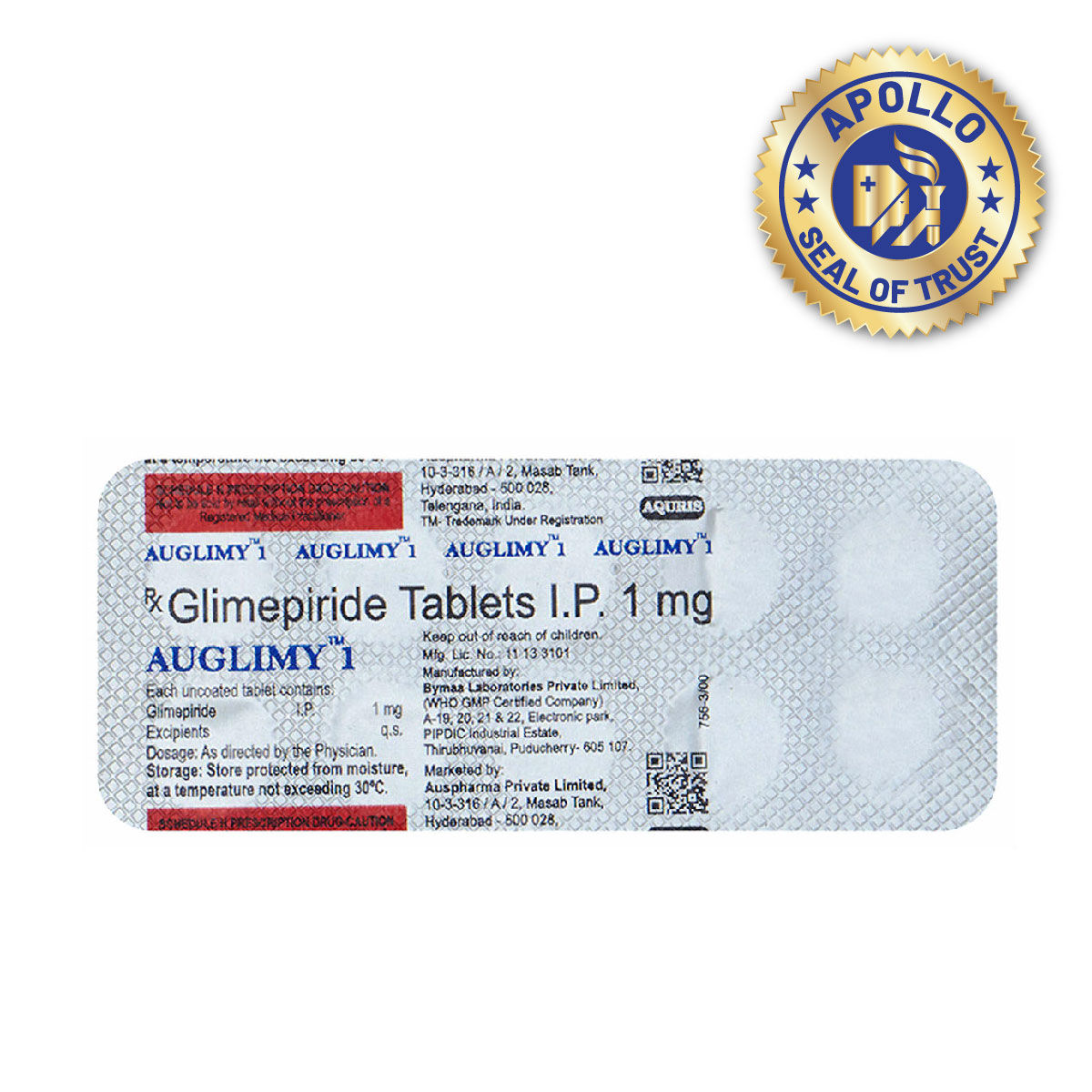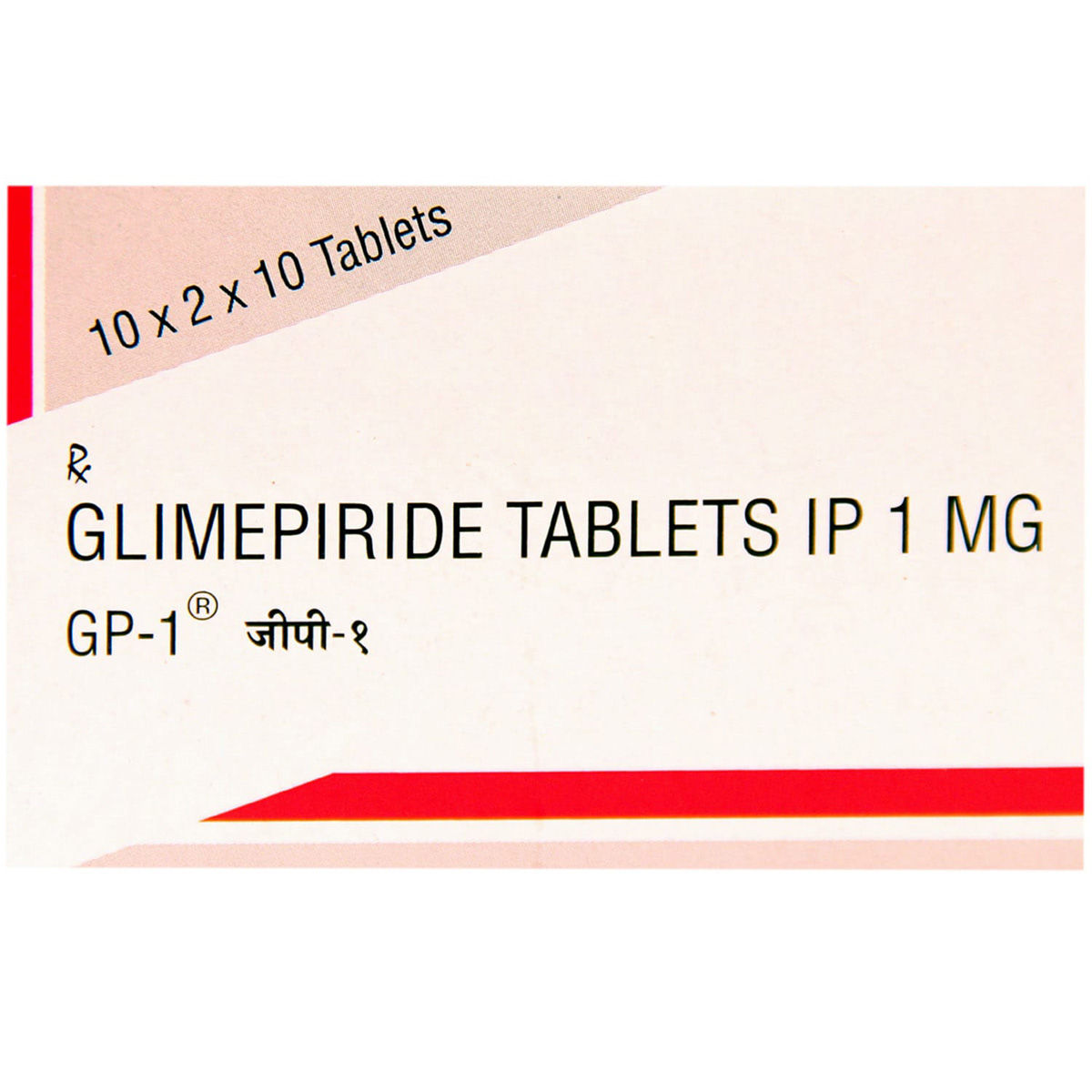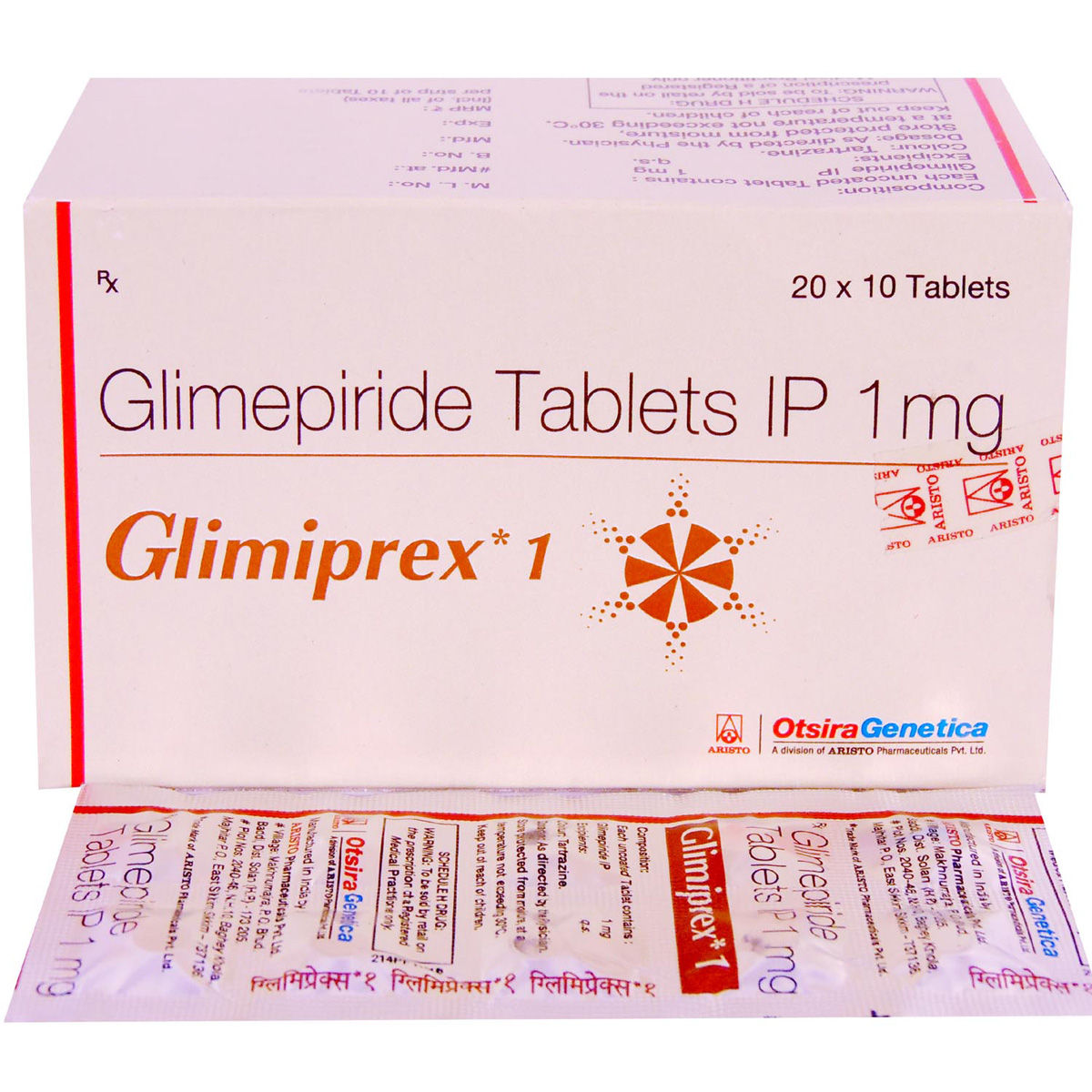Glimicure 1 mg Tablet 10's
₹32.4*
MRP ₹36
10% off
₹30.6*
MRP ₹36
15% CB
₹5.4 cashback(15%)
Free Delivery
With Circle membership
(Inclusive of all Taxes)
This offer price is valid on orders above ₹800. Apply coupon PHARMA10/PHARMA18 (excluding restricted items)
Know Your Delivery Time
Provide Delivery Location



Available Offers
 Prescription drug
Prescription drugWhats That
 25 people bought
25 people bought 
Secure Payment

India's Most Trusted Pharmacy

Genuine Products
Composition :
Manufacturer/Marketer :
Consume Type :
Return Policy :
Expires on or after :
About Glimicure 1 mg Tablet
Glimicure 1 mg Tablet belongs to a class of antidiabetic called 'sulfonylureas' used to lower raised blood sugar levels in Type 2 diabetes mellitus (non-insulin-dependent diabetes mellitus - NIDDM). Type 2 diabetes develops if the body does not produce enough insulin or when your body's insulin does not work as well as it should. Insulin is a substance that helps to lower the level of sugar in your blood, especially after meals.
The Glimicure 1 mg Tablet contains Glimepiride which acts on insulin-secreting cells called beta cells inside the pancreas and activates calcium channels on cells which lets insulin pass out of the cell. This insulin then makes each cell in the body take up glucose and utilize it, thus lowering raised blood glucose. Therefore, it prevents symptoms of type 2 diabetes.
Take Glimicure 1 mg Tablet as prescribed by your doctor. Some people may experience an allergic reaction (skin rash, hives & sensitivity to sun rays), liver dysfunction (jaundice, bile duct blockage, and hepatitis), seizures, coma & low glucose levels. Most of these side effects of Glimicure 1 mg Tablet do not require medical attention and gradually resolve over time. However, if the side effects persist or worsen, please consult your doctor.
Glimicure 1 mg Tablet should not be stopped even if you feel better without consulting your doctor as the sugar level keeps changing. If you stop taking Glimicure 1 mg Tablet abruptly, it may increase your sugar levels which could further increase the risk of eyesight loss (retinopathy), kidney (nephropathy) and nerve damage (neuropathy). Glimicure 1 mg Tablet should not be taken if you have type 1 diabetes mellitus or severe kidney or liver disease. Please inform your doctor if you have any heart disease or plan to get pregnant or breastfeed.
Uses of Glimicure 1 mg Tablet
Directions for Use
Medicinal Benefits
Glimicure 1 mg Tablet is used in people with type 2 diabetes to minimize elevated blood sugar levels with a balanced diet and exercise in combination. Glimicure 1 mg Tablet can be combined with insulin or other forms of oral antidiabetic medication. Glimicure 1 mg Tablet decreases blood sugar levels in a diabetic patient by increasing the production and secretion of insulin from the pancreas beta cells. Thus, it helps in controlling increased blood sugar levels after the meal.
How Glimicure 1 mg Tablet Works
Storage
Side Effects of Glimicure 1 mg Tablet
Allergic reactions
Headache
Nausea
Blood pressure drop
Shock
Abnormal liver function
Including skin and eye yellowing (jaundice)
Bile flow issues (cholestasis)
Liver inflammation (hepatitis) or failure of the liver
What if I have taken an overdose of Glimicure 1 mg Tablet
Drug Warnings
Before taking Glimicure 1 mg Tablet , inform your doctor if you are healing from injury, had or going to have surgery, have fever infections or other sources of stress, then contact your doctor as it might be appropriate to adjust care temporarily. If you have a serious kidney/liver disease, breastfeeding or pregnant, consult the doctor before using Glimicure 1 mg Tablet . Do not take Glimicure 1 mg Tablet if you are allergic to sulpha drugs, glimepiride, or any other antidiabetic medicines or have a deficiency of glucose 6-phosphate dehydrogenase (G6PD). A heart disease patient should consult a doctor before taking the Glimicure 1 mg Tablet as it may worsen the heart disease's current conditions. Do not take Glimicure 1 mg Tablet with oral contraceptives as it may increase blood sugar levels. On the other hand, taking Glimicure 1 mg Tablet with pain killers like aspirin or ibuprofen can lower your blood sugar.
Drug-Drug Interactions
Drug-Drug Interactions
Login/Sign Up
Co-administration of Furosemide may interfere with blood glucose control and lower the effectiveness of Glimicure 1 mg Tablet 10's.
How to manage the interaction:
Although there is a possible interaction, Glimicure 1 mg Tablet 10's can be taken with furosemide if prescribed by the doctor. Regular monitoring of blood glucose levels is advised. Do not discontinue the medications without consulting a doctor.
Co-administration of Glimicure 1 mg Tablet 10's with Levofloxacin can affect blood glucose levels. Both hyperglycemia (high blood glucose) and, less frequently, hypoglycemia (low blood glucose) have been reported.
How to manage the interaction:
Co-administration of Levofloxacin with Glimicure 1 mg Tablet 10's can result in an interaction, it can be taken if a doctor has advised it. Consult the prescriber if you experience dizziness, drowsiness, headache, nervousness, confusion, tremors, nausea, hunger, weakness, perspiration, palpitation, and rapid heartbeat, increased urination, increased thirst, or increased hunger. Monitoring of blood glucose levels is advised. Do not discontinue the medications without consulting a doctor.
Bumetanide may interfere with blood glucose control and reduce the effectiveness of Glimicure 1 mg Tablet 10's.
How to manage the interaction:
Although there is a possible interaction, Glimicure 1 mg Tablet 10's can be taken with bumetanide if prescribed by the doctor. Monitoring of blood glucose levels is advised.
Taking Glimicure 1 mg Tablet 10's with Sibutramine may lose the weight and may leads to hypoglycemia sometimes.
How to manage the interaction:
Although there is a possible interaction, Glimicure 1 mg Tablet 10's can be taken with sibutramine if prescribed by the doctor. The doctor may advise frequent monitoring of a blood sugar and adjustment of your diabetic regimen both during and after treatment with sibutramine. Let the doctor know if you experience symptoms of low blood glucose such as headache, dizziness, drowsiness, nervousness, confusion, tremor, nausea, hunger, weakness, perspiration, palpitation, and rapid heartbeat. Do not discontinue the medications without consulting a doctor.
Taking Glimicure 1 mg Tablet 10's with Gatifloxacin may affect blood glucose levels. Both low blood glucose and, less frequently, high blood glucose have been reported.
How to manage the interaction:
Gatifloxacin is not recommended for patients with diabetes, however, it can be taken if advised by a doctor. Consult the prescriber if you experience symptoms such as nervousness, confusion, headache, dizziness, drowsiness, tremors, nausea, hunger, weakness, perspiration, palpitation, rapid heartbeat, increased urination, increased thirst, and increased hunger. Maintaining blood glucose levels is advised. Do not discontinue the medications without consulting a doctor.
Taking Ketoprofen with Glimicure 1 mg Tablet 10's may increase the risk of hypoglycemia (low blood sugar).
How to manage the interaction:
Although there is a possible interaction, Glimicure 1 mg Tablet 10's can be taken with Ketoprofen if prescribed by the doctor. Consult the prescriber if you experience symptoms of low blood sugar such as headache, dizziness, drowsiness, nervousness, confusion, tremor, nausea, hunger, weakness, perspiration, palpitation, and rapid heartbeat. Do not taking the medications without consulting a doctor.
Concomitant use of bisoprolol with Glimicure 1 mg Tablet 10's may increase the risk, severity, and/or duration of hypoglycemia (low blood sugar). It may also mask some of the symptoms of hypoglycemia such as palpitation, tremor, and rapid heartbeat, making it more difficult to recognize an oncoming episode.
How to manage the interaction:
Although there may be an interaction, bisoprolol can be taken with Glimicure 1 mg Tablet 10's if prescribed by the doctor. Consult the prescriber if you develop symptoms of low blood sugar like shakiness, dizziness, sweating, nausea, hunger, weakness, or lightheadedness.
Co-administration of Sparfloxacin with Glimicure 1 mg Tablet 10's can affect blood glucose levels. Both high blood glucose and, less frequently, low blood glucose have been reported.
How to manage the interaction:
Although there is a possible interaction, Glimicure 1 mg Tablet 10's can be taken with Sparfloxacin if prescribed by the doctor. Consult the prescriber if you experience symptoms of low blood sugar such as headache, dizziness, drowsiness, nervousness, confusion, tremor, nausea, hunger, weakness, perspiration, palpitation, and rapid heartbeat (or) symptoms of high blood sugar like increased thirst, increased hunger, and increased urination. Monitoring of blood glucose levels is advised. Do not discontinue the medications without consulting a doctor.
Co-administration of Glimicure 1 mg Tablet 10's with Grepafloxacin can sometimes affect blood glucose levels. Both hyperglycemia (high blood glucose) and, less frequently, hypoglycemia (low blood glucose) have been reported.
How to manage the interaction:
Although there is a possible interaction between Glimicure 1 mg Tablet 10's and Grepafloxacin, you can take these medicines together if prescribed by a doctor. If you experience any of these symptoms - low blood sugar, headache, dizziness, sleepiness, confusion, shaking, feeling hungry, weak, heart racing, high blood sugar, low blood sugar, serious infections, bleeding, feeling anxious, feeling sick or very thirsty - make sure to call a doctor right away. Do not stop using any medications without talking to a doctor.
Taking Glimicure 1 mg Tablet 10's with Enoxacin, may affect blood glucose levels which may lead to hypoglycemia (low blood glucose) and hyperglycemia (high blood glucose).
How to manage the interaction:
Taking Glimicure 1 mg Tablet 10's with Enoxacin together can possibly result in an interaction, but it can be taken if a doctor has advised it. This can be a good thing if you need help lowering your blood sugar, but it can also be a problem if it goes too low. If you notice any of these symptoms, it's important to contact a doctor right away. Do not stop using any medications without a doctor's advice.
Drug-Food Interactions
Drug-Food Interactions
Login/Sign Up
Diet & Lifestyle Advise
Do regular exercise such as cycling, walking, jogging, dancing or swimming for a minimum of 30 minutes per day. Invest at least 150 minutes of your week in exercise.
Maintain healthy body weight as obesity is also related to the onset of diabetes.
Maintain a low fat and a low sugar diet. Replace carbohydrates containing foods with whole grains, fruits and vegetables as carbohydrates turn to sugars leading to high blood sugar.
Avoid consumption of alcohol and quit smoking.
Habit Forming
Therapeutic Class
Glimicure 1 mg Tablet Substitute

Auglimy 1 Tablet 10's
₹3.60per tabletAb-Glymprd 1 Tablet 10's
₹4.10per tabletAmaryl 1 mg Tablet 30's
₹3.72per tabletGp-1 Tablet 10's
₹3.69per tabletZoryl-1 Tablet 15's
₹3.72per tablet
Product Substitutes
Alcohol
Caution
Not recommended to take Glimicure 1 mg Tablet with alcohol. Alcohol intake may increase or decrease the blood sugar lowering action of Glimicure 1 mg Tablet in an unpredictable way resulting in a harmful event.
Pregnancy
Caution
Glimicure 1 mg Tablet is a pregnancy Category C medicine which means that there are no well-controlled studies that have been done in pregnant women. However, if you are taking Glimicure 1 mg Tablet during pregnancy, stop taking it at least 2 weeks before your due date or as prescribed by your doctor.
Breast Feeding
Caution
Not recommended to be taken by breastfeeding mothers. Glimicure 1 mg Tablet may pass into breast milk and may cause the risk of low blood sugar in the infant. Consult your doctor for further advice.
Driving
Caution
Not recommended in patients with fluctuating glucose levels. Glimicure 1 mg Tablet can reduce the ability to concentrate or react, if your blood sugar is lowered (hypoglycemia) or raised (hyperglycemia) or if you develop visual problems as a result of such conditions. Thus not recommended as the patient can endanger himself or others (e.g. when driving a car or using machines).
Liver
Caution
Not recommended in patients with liver dysfunction. A patient should consult a doctor before taking Glimicure 1 mg Tablet as it may cause liver damage.
Kidney
Caution
Not recommended in patients with kidney dysfunction. A patient should consult a doctor before taking Glimicure 1 mg Tablet as it may cause kidney damage.
Children
Unsafe
Glimicure 1 mg Tablet is not approved for use by a person less than 18 years old.
FAQs
Country of origin
Manufacturer/Marketer address
Customers Also Bought
Disclaimer
Author Details
We provide you with authentic, trustworthy and relevant information
Recommended for a 30-day course: 3 Strips




























